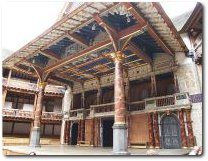The Taming of the Shrew Contents
- Social / political context
- Religious / philosophical context
- The theatrical context
- The Taming of the Shrew Induction Scene 1
- The Taming of the Shrew Induction Scene 2
- The Taming of the Shrew Act 1 Scene 1
- The Taming of the Shrew Act 1 Scene 2
- The Taming of the Shrew Act 2 Scene 1
- The Taming of the Shrew Act 3 Scene 1
- The Taming of the Shrew Act 3 Scene 2
- The Taming of the Shrew Act 4 Scene 1
- The Taming of the Shrew Act 4 Scene 2
- The Taming of the Shrew Act 4 Scene 3
- The Taming of the Shrew Act 4 Scene 4
- The Taming of the Shrew Act 4 Scene 5
- The Taming of the Shrew Act 5 Scene 1
- The Taming of the Shrew Act 5 Scene 2
Permanent theatres
The rise of non-religious drama
When England became a Protestant country during the reign of Henry VIII, and again under Queen Elizabeth, the Church no longer supported the use of drama. Instead there was a rise in secular plays.
The actors still had no fixed playhouse, but performed either in venues around the country such as inn-yards, or in the houses of aristocrats.
Government attitudes to drama
Since these plays could be politically provocative, the government eventually made moves to restrict them, in particular by targeting the touring actors – or ‘strolling players’ as they are sometimes called - such as Shakespeare depicted in Hamlet.
In 1572, Parliament passed an act which imposed severe penalties on vagabonds – and touring actors came into this category unless they were in the service of an aristocratic master. Thus actors in Shakespeare’s day had to belong to acting companies and perform under the patronage of members of the court or other powerful noblemen. Initially the Earl of Leicester applied for an official licence for a particular group of actors, which included Shakespeare, who became known as Lord Leicester’s Men.
In 1594 the company came under the patronage of Henry Carey, cousin to Queen Elizabeth and Lord Chamberlain from 1585-1596. They became The Lord Chamberlain’s Men, with Shakespeare as playwright, Richard Burbage as lead actor, William Kemp as clown and a number of other people as share-holders and actors. When James I came to the throne, the company became known as The King’s Men
Constraints on performance
Acting companies such as The Lord Chamberlain’s Men performed both in private performances (at court) or in large public performances (in purpose-built playhouses) but were limited to certain times and places:
- Plays were not permitted to be performed in the City of London and from 1575 they took place in the ‘liberties’ outside the City. The amphitheatres, bear baiting pits and other places of entertainment were all outside the city walls and clustered on the South Bank of the Thames
- Performances were not permitted during sermons, so as not to distract play-goers from religious observance
- Nor were they permitted during times of plague. Large groups of people congregating in small places during outbreaks was a health hazard. During times of plague, such as the outbreak that lasted from January 1593 to the spring of 1594, the theatres were closed and playing companies were forced to tour the provinces for their livelihood.
The role of James Burbage
Burbage was a carpenter by trade as well as an actor, and decided to build the first permanent theatre in England. Since theatres within the City were not allowed, Burbage leased a site in 1576 just outside the jurisdiction of the City, and constructed the first English playhouse, which he called simply The Theatre. Shakespeare’s company performed at The Theatre. It was one of the first permanent theatres: an amphitheatre with galleries surrounding an open yard. Audiences stood in the yard or were seated in the tiered galleries around the stage.
The popularity of theatres
 Within a short while several other theatres, such as the Curtain, the Fortune and the Swan, were also built. By 1599, when the lease of the land on which The Theatre was built had run out, Burbage's sons and their company, The Lord Chamberlain's Men, had constructed the most famous theatre of all, The Globe, on the south bank of the Thames.
Within a short while several other theatres, such as the Curtain, the Fortune and the Swan, were also built. By 1599, when the lease of the land on which The Theatre was built had run out, Burbage's sons and their company, The Lord Chamberlain's Men, had constructed the most famous theatre of all, The Globe, on the south bank of the Thames.
The population of London was still closely knit enough for the theatre of Shakespeare’s day to have a profound impact on the whole of society, much as television drama does today. It was a powerful medium to entertain, and to unite popular sentiment and provoke thought, something that ‘everybody talked about’.